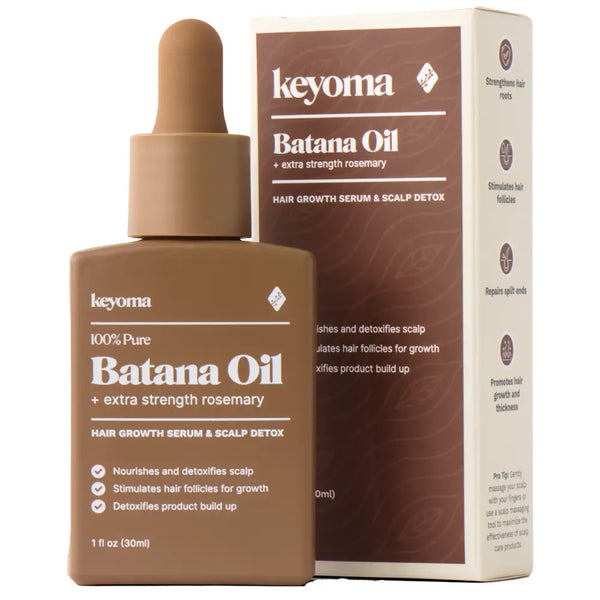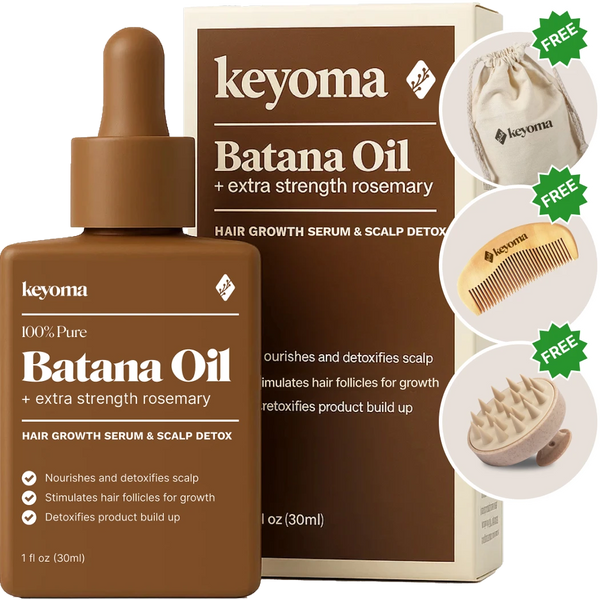In this article
When choosing oils, two common extraction methods are cold pressing and hot pressing. Both draw oil from seeds or nuts, but the steps and the final oil’s traits aren’t the same.
Below, you’ll see how cold-pressed and hot-pressed oils differ, with clear pros and cons for each method.
Key Takeaways
-
Cold-pressed batana retains more antioxidants and unsaponifiables that support scalp barrier health.
-
Hot-pressed refined oil provides neutral scent, lighter color, and greater processing stability.
-
High-heat refining can form 3-MCPD and glycidyl esters, while cold-pressed shows low baseline.
-
Cold-pressed requires cool, dark storage because pigments and metals reduce oxidative stability.
What Is Cold-Pressed Batana Oil?

Cold-pressed batana oil is produced by mechanically pressing the nuts while keeping temperature low, typically below 120 degrees Fahrenheit.
Working at lower heat helps preserve nutrients and limits oxidation and breakdown. Because the process avoids high heat and chemical solvents, cold-pressed oils are often viewed as more supportive for hair than many other oils.
Benefits of Cold-Pressed Batana Oil
Cold pressing helps batana retain tocotrienols, tocopherols, carotenoids, and other unsaponifiables that matter for scalp defense and hair feel.
These antioxidants can ease oxidative stress on the scalp, and plant-oil lipids support barrier repair in irritated skin. Batana, a palm-family oil, carries carotene- and vitamin E–type compounds; heat and refining tend to reduce them.
Higher Antioxidant Retention
Lower-temperature pressing can preserve tocotrienols, tocopherols, and phenolics that help counter lipid peroxidation on scalp and hair fibers. This supports a healthier scalp setting for growth. Small human trials also report tocotrienol supplementation increased hair counts versus placebo.
Preserves Hair-Friendly Minor Lipids
Cold pressing keeps phytosterols and other unsaponifiables that add emolliency, reduce roughness, and may help calm irritated scalp skin. These classes are partly stripped during bleaching and deodorization.
Better Leave-In Feel at Low Dose
Richer bioactives often mean you can use a smaller amount to get slip and softness, which helps avoid buildup on fine or thinning hair. For me, a pea-size pre-wash amount avoided heaviness and still improved glide.
Native Scent and Color for Sensory Cues
Unrefined batana retains natural volatiles and pigments, useful when you want a more “whole-oil” sensory profile for pre-wash and scalp-oiling routines.
What Is Hot-Pressed Batana Oil?

Hot-pressed batana oil is obtained by heating the material before pressing. The added heat helps release oil and raise yield, and the nuts are often roasted prior to pressing.
High temperature and pressure during hot pressing can shift the oil’s nutritional profile. Because yield is higher and costs are lower, hot-pressed oil is common in cheap products.
Benefits of Hot-Pressed Batana Oil
Hot pressing plus refining trades some micronutrients for uniformity, neutral scent, and fewer impurities, which can suit sensitive users and color-safe formulas. Refining removes free fatty acids, odor-active volatiles, and peroxides, improving stability and batch-to-batch consistency for shampoos, masks, and serums.
Lower Irritant Load After Refining
Taking out free fatty acids, peroxides, and volatiles can reduce stinging and odor carryover in scalp leave-ins and rinse-offs, and it slows rancid notes during storage.
Neutral Scent and Light Color
A cleaner base makes it easier to control fragrance and avoid tint transfer on light hair or linens.
More Process-Stable in Heated Steps
Refined oil tolerates controlled heating in emulsification well and begins with lower oxidation markers, which supports consistent viscosity and performance in finished haircare.
Consistent Specs for Scale
Standardized impurity levels and lower batch variability make it simpler to hit the same slip, spread, and rinse profile across runs.
Cold-Pressed vs Hot-Pressed Batana Oil: Quick Comparison
If you want scalp contact and bioactive density, cold-pressed is the stronger pick. It limits process-related contaminants and keeps more protective compounds that help defend the scalp barrier.
Refined oil can fit long, heated manufacturing, but for leave-on or short-contact hair routines, higher antioxidant and unsaponifiable levels favor cold-pressed.
Here’s a quick side-by-side of cold-pressed batana oil and hot-pressed batana oil.
|
Cold-Pressed vs Hot-Pressed Batana Oil |
||
|
Factor |
Cold-Pressed Batana Oil |
Hot-Pressed/Refined Batana Oil |
|
Processing contaminants |
Very low baseline for 3-MCPD and glycidyl esters because there is no high-heat deodorization. |
Risk of forming 3-MCPD esters and glycidyl esters during high-temperature deodorization; regulators set limits for these contaminants. |
|
Bioactive density |
Better retention of tocopherols/tocotrienols, phenolics, and phytosterols that support antioxidant defense on scalp. |
Refining steps reduce tocopherols and other minor bioactives. |
|
Barrier-supportive lipids |
Keeps more unsaponifiables (sterols, squalene) that aid skin-barrier function, useful for sensitive scalps. |
Fewer unsaponifiables after refining; more neutral base for labs but less intrinsic barrier support. |
|
Stability trade-off |
Higher natural antioxidants, but pigments/metals can lower oxidative stability if storage is poor; use dark bottle and cool storage. |
Typically more oxidation-stable after removing pigments/impurities; suited to long, hot processing. |
FAQs
Is cold-pressed batana oil better?
Cold pressing preserves most nutrients, while hot pressing, though yielding more oil, may reduce some nutritional qualities.
Is cold-pressed oil better for hair?
There are many oils to choose from, but cold-pressed options are among the best for natural hair care. Unlike many refined oils, cold-pressed oils aren’t extracted with high heat or harsh chemicals.
Does cold-pressed batana oil make your hair grow?
Batana oil is popular among natural beauty fans who say scalp use boosts shine, feel, and growth. Scientific evidence is limited, though nutrients in batana oil—including antioxidants and fatty acids—are associated with general hair and scalp support.
Get Your Cold-Pressed Batana Oil Today From Keyoma
Don’t cut corners with scalp care. The biggest mistake is choosing batana oil only by price. If you want a healthy scalp and vibrant hair, the smarter move is cold-pressed.
Keyoma Pure Batana Oil with Rosemary keeps key nutrients and antioxidants that hot-pressed oils often lose. If you’re seeking real nourishment and scalp support, choose the best. Ready to notice the change? Use Keyoma’s pure cold-pressed batana oil for hair and scalp care.
Featured Product
100% Pure Batana Oil + Rosemary
↓Best Batana Oil to Buy↓
1 Month
Subscribe & Save
- 30-day supply delivered monthly $35
- 30% off for life $6
- Free haircare essentials kit $33
- Free custom wooden comb $10
- Free scalp massager $15
- Free eco-friendly travel bag $8
- 30-Day Money Back Guarantee
- Free Shipping
- Online portal for easy cancel, skip, or pause.
1 Month One Time Purchase

- 30-day supply $50
- 30% off for life $6
- Free haircare essentials kit $33
- Free custom wooden comb $10
- Free scalp massager $15
- Free eco-friendly travel bag $8








